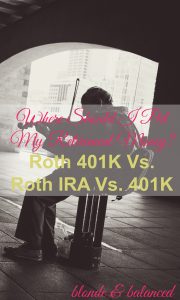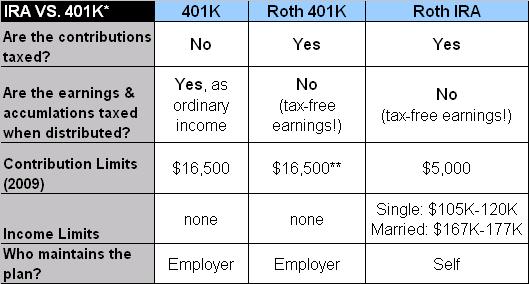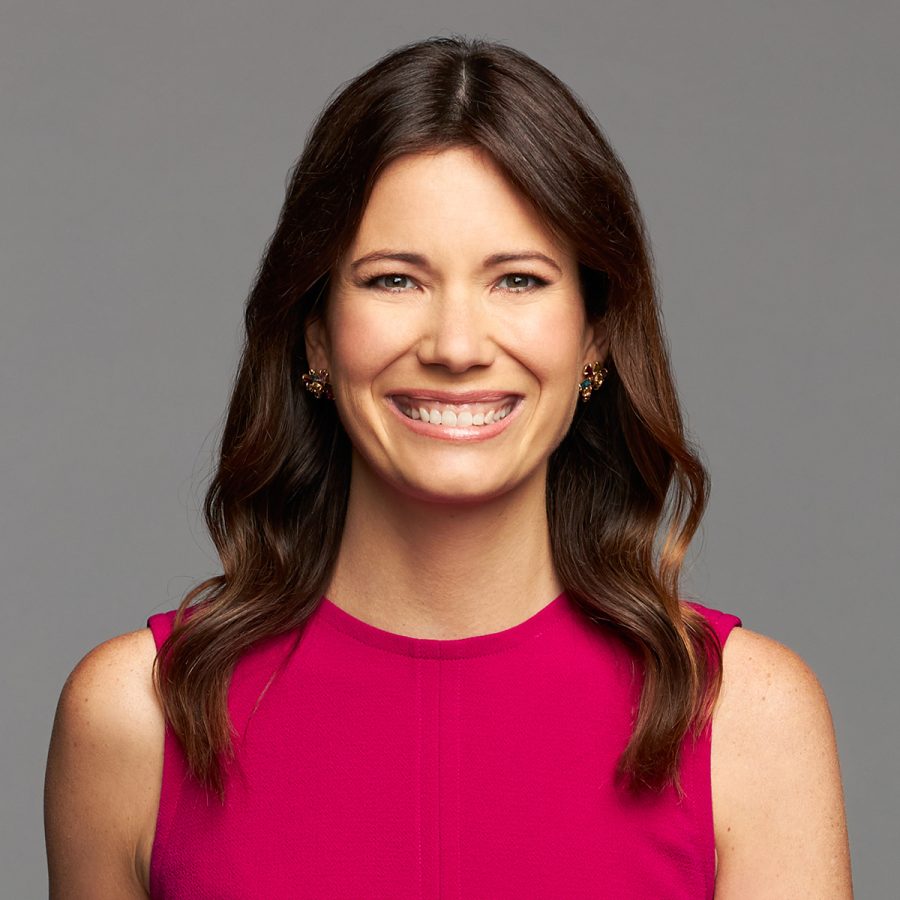 Unless you have the IQ of Lindsay Lohan (sorry, Linds), you’re probably smart enough to know by now that you should be socking away a good deal of money into one of those handy-dandy retirement accounts. This is especially true for us young’ns who have years upon years for our money to ride out the recession and start compounding earnings like rabbits.
Unless you have the IQ of Lindsay Lohan (sorry, Linds), you’re probably smart enough to know by now that you should be socking away a good deal of money into one of those handy-dandy retirement accounts. This is especially true for us young’ns who have years upon years for our money to ride out the recession and start compounding earnings like rabbits.
We all thought we knew everything there is to know about 401Ks and Roth IRAs until the new retirement tool waltzed in like he owned the investment-world. Well, hell-ooo there Mr. Roth 401K. You’re looking mighty attractive, aren’t you?
Here’s the deal. Roth investments are amazing for one simple reason:
The earnings you make from a Roth investment are 100% tax-free when distributed to you in retirement.
That means that, even though the money you contribute to your Roth IRA/401K has already been taxed, any – and I mean ANY – earnings you make from your Roth is 100% NOT TAXED. This is why Roth IRAs are such an amazing retirement tool, but also why they come with some limitations that weed out those uber-rich guys.
If you’re new to retirement accounts, I put together a very minimal table showing the basic key points about these three types of retirement tools – the 401K, Roth 401K, and the Roth IRA:

*These are just the bare basics – there is so much more to these investments than what I’ve listed. **$16,500 is the max total you can contribute to both a 401K AND/OR a Roth 401K
As you can see, there are pros and cons and several differences among each account. Can I tell you whether you should put your money in one over the other? No, I can’t. But I can help show you the benefits of each tool. However, if I had the option of using a Roth 401K, I would be ALL OVER that. 😉
Here are more fun facts about these retirement investments:
ROTH 401K
- This type of investment is relatively new, so they are pretty rare. They haven’t become outrageoulsy popular just yet mainly because companies aren’t willing to hire more personnel to help manage the Roth 401K. If your employer offers this type of retirement, I would definitely ask your Human Resources office about the details!
- As I mentioned in the bullets above, the max is $16,500 – but only to the extent that you don’t contribute to a traditional 401K. So you can only contribute a max total of $16,500 to either account (for example, you could contribute $8,250 to each account).
- Roth 401Ks are not subject to the income limitations that Roth IRAs are! No matter what you make, you should be able to contribute.
- Employers are allowed to match contributions, but you’ll have to ask your HR department more about that for your particular company.
- Since we can’t predict the future (try as we might), we have no idea how much higher or lower our taxes will be in 30 years; the Roth 401K dodges the risk of high future taxes by having 100% tax-free distributions for you to live off of when you retire.
ROTH IRA
- To be eligible to contribute to a Roth IRA, you must have had earned income in that year. This means that you can’t use money gifted to you or scholarship money.
- You cannot contribute more than you make (a given if you abide by the first bullet).
- You can invest in many different things – stocks, bonds, mutual funds, etc.
- Did I mention that all the earnings from a Roth IRA are TAX-FREE?!
401K
- The biggest benefit to this retirement tool is the employer matching. Most companies offer some sort of matching deal up to certain amounts that you contribute. For example, your company may match up to 5% – but you’ll have to contribute at least 5% to get the full matching. It’s generally understood that you should contribute at least up to the amount that is matched, otherwise you’re passing up free money.
- You’re employer maintains this plan (similar to a Roth 401K), so it doesn’t require much effort from you, the employee. It’s simple to set up automatic withdrawals that will be deposited right into your 401K account. I recently heard a great quote from Ramit Sethi about this type of automation. He said, “Don’t make retirement about willpower, make it automated.” He couldn’t be more right – once that money is deposited into your 401K, there’s no way you can go out and spend it!
I hope this helps you along in your decision on where to put your retirement money. There are many great tools available to us for retirement that are just too good to pass up! Keep putting that money away every payday and you can rest easy knowing that your beach house and country club memberships will be fully funded whenever you’re ready to retire!







Love this post!
I opened a Roth IRA in 2008 and completely funded it with $5K. I’m close to maxing it out for 2009 as well! Hooray for future tax-free earnings!
My company offers a Roth 401k (YAY!) and of course I signed up for it. I’m in a low tax bracket since my salary is not very high at all, so I figure paying taxes now is better than in the future!! 🙂
That’s awesome that you get a Roth 401k. I currently have a 403(b) plan, so I’m going to have to pay some taxes when that sucker gets cashed out. However, I get 10% match to my salary automatically, even if I contribute nothing – so I can’t really complain about free money. =)
It probably wouldn’t hurt to mention that at a lot of personal finance gurus recommend only contributing to your 401k to the point of the match. Anything over that match shouldn’t go into your 401k but instead be put into your RothIRA.
If you have more money that you want to contribute AFTER that, FIRST – could you give me some? No? Okay, then I would not put it into the 401k but instead look into some mutual funds, bonds, CDs or stocks of your choice. My recommendation would be index funds – but don’t take my word for it – take John Bogle’s and all the Bogle-heads out there:
http://www.amazon.com/Bogleheads-Guide-Investing-Taylor-Larimore/dp/0471730335
Obviously I’m not a financial advisor, this is what I’ve learned from listening and reading what financial advisor’s have to say. <– My disclaimer
Good breakdown of the three choices. I advocate a funding both a 401(k) and Roth IRA.
At my work, the employer match goes into a standard 401K, even if your contribution goes into the Roth 401K. So you’ll automatically have some tax diversification.
Be carefull with the options in either type of 401k – diversify and watch the expense ratios. I personally just put in match (always. A bunch of that money is in a standard 401k, since my employer just started offering the Roth 401k a couple of years ago).
Then as my income rises, I first contriubuted to a Roth IRA – up to the limit, then I went back to the Roth 401k. I’m nowhere near topping the Roth 401k out, esp with the extra money the over 50 crowd can put in.
Thanks so much for the post!
No prob!
Nice Blog, and nice post to, i get so many information in this blog, i will visit this blog frequently…
I like your post, specially about
Where Should I Put My Retirement Money? Roth 401K Vs. Roth IRA Vs. 401K
Cheers